Bristol Speakers
(This event is taking place on Tuesday 12th September 2023.)
📢 Here are the current speakers we have for this event. We will also hear from you – the event is all about taking part.
Why Should You Be Prioritising Purpose?
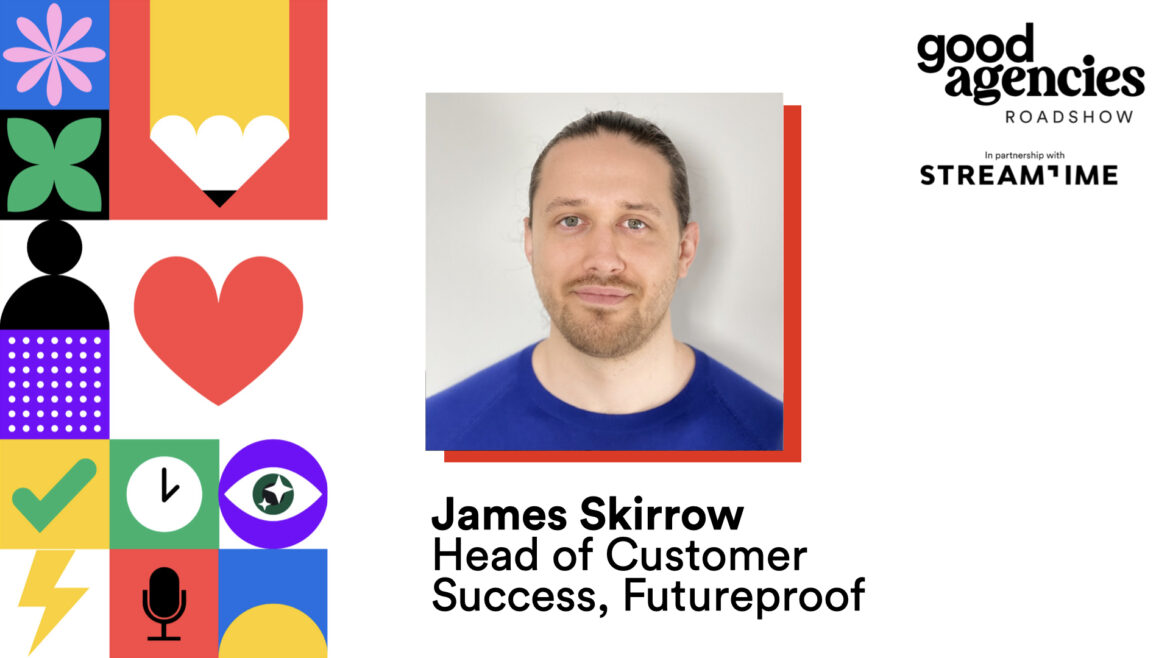
“It doesn’t have to be you become a B Corp, or you do fuck all. You can sit in the middle. That’s where the majority of people sit,” says James Skirrow, head of customer success at Futureproof.
Sometimes it’s hard to prioritise purpose, especially in the current climate. Budgets get stretched, projects get cut – all the while competitors are vying for your clients’ attention.
But according to ESG expert James Skirrow, more and more clients are looking to their agency suppliers to lead the way in terms of sustainability. So if you haven’t started on that journey yet, you better lace your boots up – or you might end up getting left behind.
Why?
- Private equity firms see it as value creation. “PE firms are stating company valuations increase by 50%+ if an organisation is building a concrete strategy to improve ESG. In the next 12-18 months in particular, this is going to be of vital importance for any firm with private equity ownership – whether its minority or majority.”
- FMCG clients want clean suppliers. “In some industries, you can afford to wait a few years to get the ball moving with sustainability. Agencies can’t. If you want to work with brands like Tesco, Cisco and Unilever as a supplier, part of the procurement process requires you to disclose your carbon emissions before you can even get in the room with them.”
- Employees are looking for more in their jobs. “74% of employees are ready to quit if health and sustainability are ignored within the company. Getting your act together not only helps keep current talent, but can also attract a new wave of talent.”
The problem a lot of agency leaders have, though, is knowing where to start. But James says you don’t need a concrete plan in place to start making a difference.
“It’s about weighing up time and effort versus reward. You can quickly get to the crux of your main issues and opportunities within sustainability without much guidance,” he says.
“When you run a company, it’s all about revenue and profit. You know that number inside out. You report on it frequently and have targets set around it. But you also want to know what goes into that number, so you can make more of it. It’s the same thing with your carbon footprint, but just working backwards.”
At the Good Agencies Roadshow, James will be going into detail about the commercial incentives of prioritising purpose and ESG, and will be sharing some tips on how you can get started on this path without breaking the bank.
Bridging the Tech Gap, One Apprentice At a Time
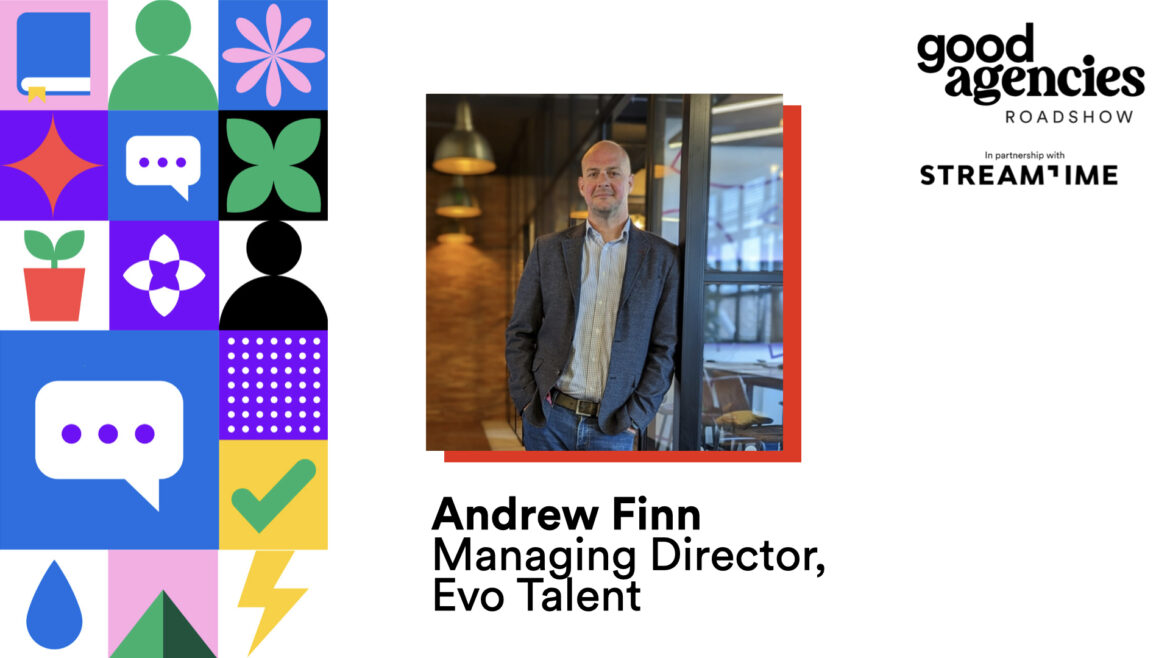
“We’re all talking about this digital tech skills gap, we’re all feeling the pain of that. But unless you start doing something about it, you’re not really going to solve the problem,” says Andrew Finn, managing director of Evo Talent and former head of talent at Evo Agency.
The tech skills gap is nothing new, with agencies across the UK struggling to find talented people with the digital skills required nowadays.
Evo has always been passionate about supporting young people in the industry, with apprentices regularly joining the business, but they wanted to take things a step further.
In his role as head of talent, Andrew had one eye on the future, and has spent the last year building relationships with schools and colleagues across the South West, to broaden young people’s education around tech and digital, and the career opportunities available to them.
“The education system really isn’t up to speed with where we are now in terms of tech and digital. What they’re learning in school just doesn’t translate to the real world is – and that’s creating a massive problem,” he says.
“I think people who have a genuine interest feel like they have to go to university and study computer science, or do a marketing degree in a big city. It’s about helping them understand they can have a really great career within digital and tech, and in their local area too.”
Now, they’re working on creating a dedicated ‘Evo Academy’, where young people can get real experience working as a ‘shadow agency’ alongside the current team. And Andrew is keen for more agencies to follow their lead.
“We’re never going to get over this skill shortage unless more businesses get involved,” he says. “It’s all about getting really great talent, along with one or two rough diamonds you might not otherwise consider, and giving them opportunities as well.”
Andrew is now the managing director of sister company Evo Talent, which the agency recently launched in direct response to this situation, and the many difficulties agencies face recruiting the right talent.
Andrew will be joining us at the Good Agencies Roadshow in Bristol to share more on how Evo is genuinely connecting with local young people and what that’s doing for the future of the agency, and how this different approach to recruitment could be a gamechanger.
“How We’re Using Nature to Build a Regenerative Business”
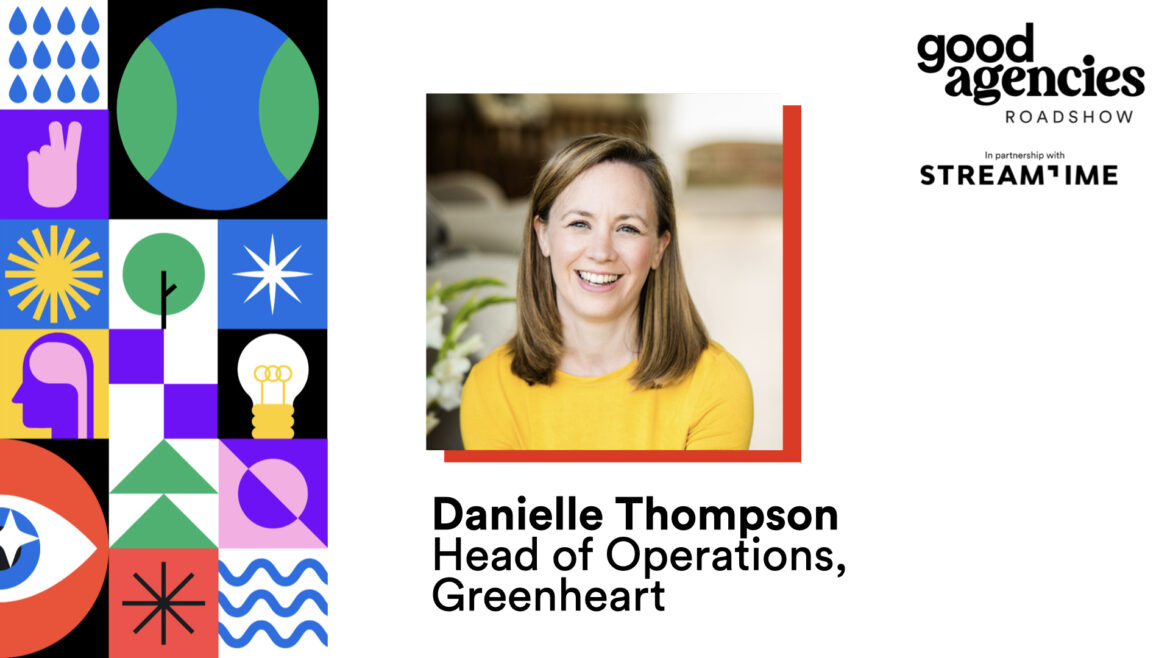
“Sustainability has, understandably, turned into mostly tick boxes and templates. What we’re saying is, actually that’s not enough. And it’s not going to help.”
Sustainability has become quite the buzzword as of late. Politely put, all it really means is to be a ‘little less bad’ – so that your business can continue to sustain itself.
But Greenheart argues that to really make an impact, you have to take it one step further.
“We’re very much on a journey to be what we call a regenerative business, which is essentially leaving the world in a better place than we found it,” says Danielle Thompson, head of operations at Greenheart.
“Rather than focusing on reducing your energy emissions, it’s about how to build a business that is a positive contributor to the world.”
Inspired by Giles Hutchins – an expert in regenerative business – founder Thomas Bourne built Greenheart with regenerative principles in mind from the beginning. His mission was to ‘redesign the way business was done.’
“There’s a whole school of thought around using nature and living systems as a guide into how businesses can operate,” says Danielle. “The theory is that nature is adaptable, it’s flexible, it’s powerful, and it has survived millions and millions of years. Why would we fight it?”
In practice, this looks like:
- Focussing personal and organisational development around purpose, rather than KPIs, objectives, or targets.
- Organising the business like a living system, not a machine. Everyone is interdependent and supported to self-manage key day-to-day aspects of their role.
- Ensuring the ‘inner’ purpose of the business and its people matches the ‘outer’ voice and offering. “There must be no divide between our talk and our walk.”
- The annual rhythm of the business is inspired by the seasons. For example, learning and development plans are set in autumn, to be implemented with enthusiasm in spring. Quarterly meetings (called Gatherings) are also aligned with each season.
“The seasons don’t exist by luck, they exist because some things need to die in order for others to regrow. In winter, everything dies off, because then it can come back more powerfully in spring.”
“So in our business, we use nature as inspiration.”
At the Good Agencies Roadshow, Danielle will be telling us more about regenerative business from an operations POV, and will share some of the things her consultancy does to leave a positive impact on the planet – not just through the work they deliver, but how they deliver it too.
The Impact of Working with ‘Good’ Clients
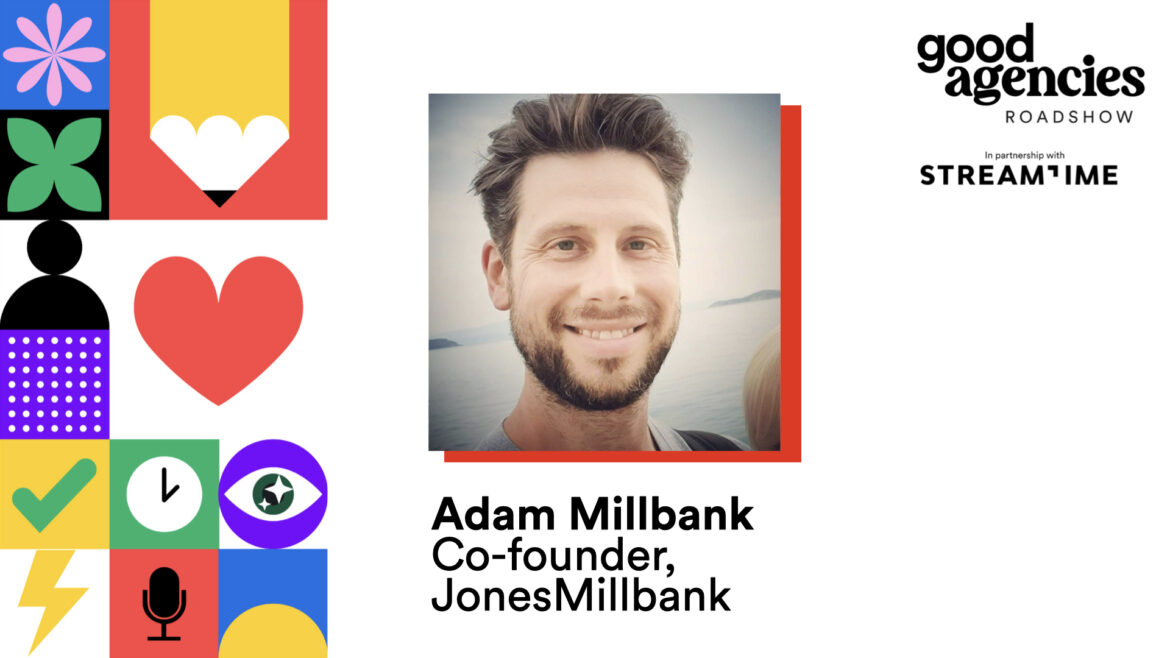
“We’re not trying to save the world, but we always make sure that the work we do is done in a way that has as little impact environmentally as possible, with the maximum positive impact,” says Adam Millbank, co-founder of JonesMillbank.
Adam and his co-founder Russell started their video production agency with a particular ethos and purpose to make impact, after their own disheartening experiences trying to make it in the industry.
This year, the agency achieved B Corp status – and the certification process only further reinforced that they’d long been working with the ‘right’ kinds of clients.
“When we delved into the client part of the B Corp assessment, we realised that actually over 90% of our clients are in the bracket of purpose-based practice,” says Adam.
The agency work with several educational clients, as well as charities, non-profits and even the NHS on all sorts of projects – and it’s just as much about the clients as it is about the team working on those projects.
“It underlined a lot of what we were already doing and helped us look at what mattered to the team,” says Adam. “We’re always talking to the team about what matters to them, and do surveys at the end of each financial year to judge which areas they’d really like to work in.”
“It’s about more than just the financial reward of being paid at the end of each month. It’s about having opportunities to learn, being challenged and enjoying what we do every day.”
For JonesMillbank, while they work with obviously purposeful clients, they also try to remain open-minded.
“Whatever the project is, we have a mission to leave a positive lasting impact on every audience, and that’s never changing. We’ve even recently built ourselves a project qualifier,” says Adam.
“With the referrals we get, some will be budget-led, some will be brief-led, and some will be impact-led. Some clients, like a tobacco company for example, will obviously hit a certain threshold, but we try and be a little bit more open-minded.”
“It’d be silly for a purpose-led organisation to dismiss certain organisations entirely because they don’t want to the association with the brand. It’s about working with initiatives and research that will get us to a better place now.”
Adam will be joining us at the Good Agencies Roadshow to talk about being a purpose-led agency, and why it’s important to work with clients on projects that will have a genuinely ‘good’ impact on the world.
“Why Our Good Intentions with Wellbeing May Be Falling Short”
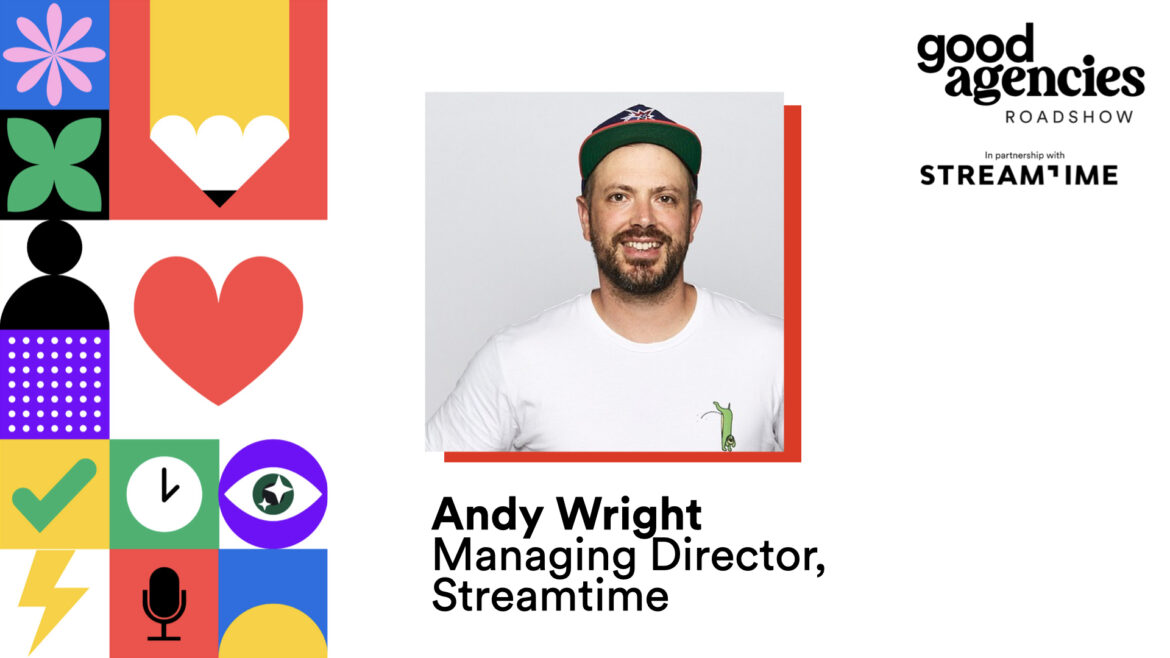
“If the most valuable assets we have are our people and their brains, why aren’t we doing more to support them and help them thrive?” asks Andy Wright, CEO of Streamtime and founder of non-profit organisation, Never Not Creative.
After a 20+ year career working in the industry, Andy now spends a lot of his time helping people and businesses to be happier and healthier, tackling some of the gaps that have been left unaddressed over the years.
Andy cautions: “When the work is elevated to the peak of importance, it can leave injustice, unfairness and illness in its wake.”
Over the last couple of years, Andy has been blurring the lines between his two roles to achieve a greater impact. Streamtime’s goal of creating happier, healthier creative businesses has certainly been influenced by the experiences that Never Not Creative has provided.
“Our Happiness Coach is a feature we’re piloting in the product. Your final To Do of the week asks you how your week was, so we can track your happiness over time. We worked very closely with Curtin University and the Future Of Work Institute to align the data we collect with their SMART work framework. Now we’re experimenting with gentle nudges on health and happiness if scores are dropping or vice versa,” says Andy.
At the Good Agencies Roadshow, Andy will share and discuss how we can create mentally healthier cultures that can help teams thrive, work excel and agencies prosper.
